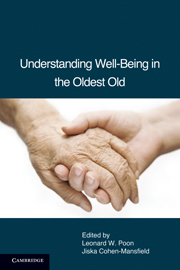Book contents
- Frontmatter
- Contents
- List of Tables
- List of Contributors
- Foreword by Carol D. Ryff
- PART I THEORY: NEW HORIZONS IN WELL-BEING RESEARCH
- 1 Toward New Directions in the Study of Well-Being among the Oldest Old
- 2 From Ageless Self to Selfless Age: Toward a Theoretical Turn in Gerontological Understanding
- 3 The Pursuit of Happiness: Alternative Conceptions of Subjective Well-Being
- 4 The Shifting Baseline Theory of Well-Being: Lessons from across the Aging Spectrum
- 5 The Model of Developmental Adaptation: Implications for Understanding Well-Being in Old-Old Age
- PART II PARADISE LOST: BETWEEN TRAUMA AND HAPPINESS
- PART III PATHWAYS AND GATEKEEPERS: MODERATING, MEDIATING, AND PROXIMAL PROCESSES
- PART IV SIGNPOSTING PARADISE: MEASUREMENT OF WELL-BEING
- Index
- References
1 - Toward New Directions in the Study of Well-Being among the Oldest Old
Published online by Cambridge University Press: 05 August 2012
- Frontmatter
- Contents
- List of Tables
- List of Contributors
- Foreword by Carol D. Ryff
- PART I THEORY: NEW HORIZONS IN WELL-BEING RESEARCH
- 1 Toward New Directions in the Study of Well-Being among the Oldest Old
- 2 From Ageless Self to Selfless Age: Toward a Theoretical Turn in Gerontological Understanding
- 3 The Pursuit of Happiness: Alternative Conceptions of Subjective Well-Being
- 4 The Shifting Baseline Theory of Well-Being: Lessons from across the Aging Spectrum
- 5 The Model of Developmental Adaptation: Implications for Understanding Well-Being in Old-Old Age
- PART II PARADISE LOST: BETWEEN TRAUMA AND HAPPINESS
- PART III PATHWAYS AND GATEKEEPERS: MODERATING, MEDIATING, AND PROXIMAL PROCESSES
- PART IV SIGNPOSTING PARADISE: MEASUREMENT OF WELL-BEING
- Index
- References
Summary
ABSTRACT
This chapter provides a road map to address the dearth of information and the central theme of this volume: well-being among the oldest old. A reality among the oldest old is the increasing variability in both subjective and psychological well-being found within an individual owing to variations in cumulative experiences and differences in strategies to survive into very old age. This chapter outlines the strategies in addressing the central theme by describing four different views on well-being among the oldest old (Section I), the influence of experiences and trauma on well-being at the end stage of life (Section II), examination of moderating and mediating influences (Section III), measurement issues (Section IV), and conclusions (Section V).
INTRODUCTION
The life course is marked by individuality and diversity. An individual's life is a process that, if scrutinized at a singular instance, would yield incorrect assumptions about its trajectory. Instead, the gradual accumulation of events in a person's life provides perspective into how that person arrived at his or her present state of well-being. This chapter provides a road map of the contents in this edited volume on the well-being of the oldest old. Although the age of the oldest-old cohort is continually increasing as a result of the rectangularization of the population pyramid, this volume defines the oldest old as those individuals older than 75 years of age. This cohort deserves its own conception of well-being because of its distinctiveness in comparison with younger generations.
- Type
- Chapter
- Information
- Understanding Well-Being in the Oldest Old , pp. 3 - 10Publisher: Cambridge University PressPrint publication year: 2011
References
- 1
- Cited by



